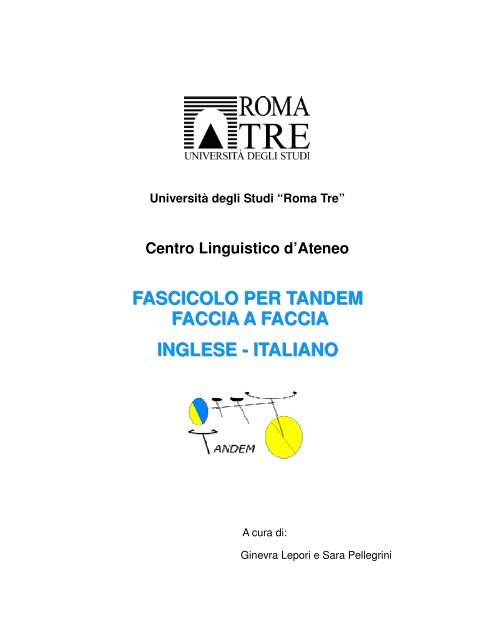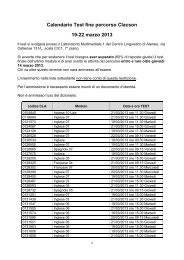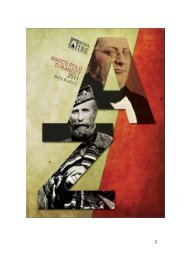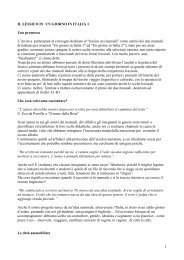Inglese - Italiano - Centro Linguistico d'Ateneo - Università degli ...
Inglese - Italiano - Centro Linguistico d'Ateneo - Università degli ...
Inglese - Italiano - Centro Linguistico d'Ateneo - Università degli ...
You also want an ePaper? Increase the reach of your titles
YUMPU automatically turns print PDFs into web optimized ePapers that Google loves.
Università <strong>degli</strong> Studi “Roma Tre”<strong>Centro</strong> <strong>Linguistico</strong> d’AteneoFASCICOLO PER TANDEMFACCIA A FACCIAINGLESE - ITALIANOA cura di:Ginevra Lepori e Sara Pellegrini
IndiceEsercizi livello A1Getting to know you pag. 1Per conoscersi pag. 3There’s no accounting for taste pag. 5De gustibus non disputandum est pag. 7Weekend pag. 9Fine settimana pag. 11Esercizi livello A2Comparing like with like pag. 12Paragoni pag. 14English food pag. 16Mangiare in Italia pag. 17Family portrait pag. 18Ritratto di famiglia pag. 19Intimate details pag. 20Dichiarazioni personali pag. 21Places of your childhood / your language pag. 22I luoghi della tua infanzia / la tua lingua pag. 23School - dreams and nightmares pag. 24Scuola - sogno e incubo pag. 25Singers / actors pag. 26Cantanti - attori pag. 27Surprising little quirks pag. 28Particolari sorprendenti pag. 29Them and us pag. 30Loro e noi - insegnanti pag. 31The questionnaire pag. 32Il questionario pag. 33i
Those bloody tests pag. 34Questi maledetti test pag. 35Tv survey pag. 36Sondaggio sulla televisione pag. 38Esercizi livello B1A great drama pag. 40Un’avventura emozionante pag. 41An eye for an eye pag. 42L’asino che vola pag. 43Bloody Hell! pag. 44Maledizione! pag. 46Discovering the country of one’s partner pag. 48Alla scoperta del paese del tuo partner pag. 49Story pag. 50Una storia inventata pag. 51Gustaff meets May pag. 52Gustaff incontra May pag. 53Holidays and celebrations pag. 54Giorni festivi e festività pag. 55Just you pag. 56Tu pag. 57Living in Britain pag. 58Vivere in Italia pag. 60Places of interest pag. 62Luoghi turistici pag. 63Speaking without words pag. 64Parlare senza parole pag. 66Tales pag. 68Fiabe e leggende pag. 69Television pag. 70Televisione pag. 71What is art? pag. 72Cos’è l’arte? pag. 74Yes, we’re different, but… pag. 76Siamo diversi però… pag. 77ii
Esercizi livello B2Debatable statements pag. 78Affermazioni discutibili pag. 80English idioms pag. 82Espressioni idiomatiche italiane pag. 84Flying the nest pag. 86Essere indipendente pag. 87Good old south yorkshire pag. 88Lazio terra d’incanto pag. 89In the press pag. 90Sui giornali pag. 91People around us pag. 92Il nostro ambiente pag. 93Proverbial chains pag. 94Dire paroloni pag. 96Proverbs pag. 98Proverbi pag. 100The art of persuasion pag. 102L’arte di convincere pag. 103The holiday of your dreams pag. 104Un viaggio da sogno pag. 105What’s your system like? pag. 106Com’è in realtà da voi? pag. 107Words pag. 108Parole pag. 109iii
A1Getting to know you *A questionnaire to begin withAsk your partner these questions. Write down his/her answers also in English.He/she will ask you the same questions for you to answer in your language.Help your partner to understand and note down your replies.Studies/ProfessionDo you study? (Yes/no)Do you work? (Yes/no)What do you study/do?Where?Since when?Do you like your work/job?AccommodationWhere do you live?Is it far from your work/studies?How do you get to work?How much do the fares cost?Do you pay a lot for rent?Free timeHave you got/ Do you have a lot of free time?What do you spend it on?Have you got other hobbies and interests?If you haven't understood everythingWhat?Can you repeat that?* La revisione del fascicolo è a cura di Serena Rosso. Tutti gli esercizi in lingua inglese sono dal sito :http://www.slf.ruhr-uni-bochum.de/1
A little slower, please.Sorry but I still don't get it.Write it down, please!ReactionsThe same as me.Is that possible?Get away!So much?That's not a lot.2
Per conoscersi *Quando sono come sono, sono ioPoni al tuo partner queste domande in italiano. Appuntati le sue risposte, chedovranno essere in italiano.Lui/Lei ti chiederà lo stesso nella tua lingua e tu risponderai nella tua lingua.Aiutalo/la a capire e ad annotarsi le tue risposte.Studio/LavoroStudi? Si/No Lavori? Sì/NoCosa?Dove?Da quando?Ti piace il tuo studio/il tuo lavoro?AbitazioneDove abiti?É lontano dall’università/dal tuo posto di lavoro?Come vai al lavoro?Quanto costano i mezzi di trasporto ?Paghi molto per l’affitto?Tempo liberoHai del tempo libero?Cosa fai quando ne hai?Hai (ancora altri) hobby?Se non hai capito tutto:* Traduzione presa dal sito : http://www.slf.ruhr-uni-bochum.de/3
Come?Puoi ripetere, per favore?Un po’ più piano, per favore.Mi dispiace, ma continuo a non capire.Scrivilo per favore.Fammi un esempio.ReazioniProprio come me.Davvero?Veramente?Così tanto?Ma non è poi tanto!Interessante.4
There's no accounting for tasteWe all know that but we are assuming that each of you would like to know whathis or her partner likes.TasksBelow we have provided for a series of subjects you can ask each otherabout using the following questions:• Do you like it? Why (not)?• What does it remind you of?• What do you associate it with?Note down in the spaces in English your partner's responses.FlowersModern artThe sunMiceWar filmsMineral waterVelvetThe moonLeather jacketsFogFishSeaCakes5
Results/ brief summary of conversation/comment………………………………………………………………………………………………………………………………………………………………………………………………………………………………………………………………………………………………………………………………………………………………………………………………………………………………………………………………………………………………………………………………………………………………………………………………………………………………………………………………………………………………………………………………………………………………………………………………Time spent on this topic5 Min 10 Min 15 Min 20 Min longerLanguage mainly used in this exerciseEnglish ItalianTopic/exercise interestingnot interesting6
De gustibus non disputandum est *Ok, questo lo sanno tutti. Ma supponiamo che ognuno/a di voi desideri sapereche cosa piace o non piace al /alla partner.AttivitàDi seguito proponiamo una serie di temi sui quali dovete intervistarvi l'un l'altro,magari con le seguenti domande:• Ti piace? Perché (no)?• Che cosa ti ricorda?• Che cosa vi associ?/ A cosa ti fa pensare?Annota nelle caselle in italiano le risposte del tuo/della tua partner.FioriMusei di arte modernaSoleTopiFilm di guerraAcqua mineraleMusica popGiacche di pelleNebbiaDolciPesciVecchie fotoIl mare* Traduzione presa dal sito http://www.slf.ruhr-uni-bochum.de/7
Risultati/breve riassunto della conversazione/commenti………………………………………………………………………………………...........………………………………………………………………………………………...........………………………………………………………………………………………...........………………………………………………………………………………………...........………………………………………………………………………………………...........………………………………………………………………………………………...........………………………………………………………………………………………............................................................................................................................................Quanto tempo avete impiegato per fare questo esercizio?5 Min 10 Min 15 Min 20 Min di piùIn che lingua avete fatto l'esercizio?<strong>Inglese</strong> <strong>Italiano</strong>Tema/esercizio interessantenon interessante8
WeekendFinally the weekend is here. Discuss what you would like to do.Also speculate about what other people might like to do. Here are some ideas:youyour partneryour parentsyour sisteryour brotheryour best friendyour class teacherthe neighbourMary Robinsonyour favourite teacherthe parish priestthe postman???go dancingto finish off some job inpeacesleep until the afternoonclean the cartidy the room/house/flatread a bookgo for a long walkdo nothing at allwatch TVplay tennis/football etc.play cardswrite a letter???Results/ brief summary of conversation/comment………………………………………………………………………………………………………………………………………………………………………………………………………………………………………………………………………………………………………………………………………………………………………………………………………………………………………………………………………………………………9
………………………………………………………………………………………………………………………………………………………………………………………………………………………………………………………………………………………………Time spent on this topic5 Min 10 Min 15 Min 20 Min longerLanguage mainly used in this exerciseEnglish ItalianTopic/exercise interestingnot interesting10
Fine settimana *Finalmente è arrivato il fine settimana. Parlate di cosa fareste volentieri.Raccontate anche cosa farebbero volentieri altre persone. Qui ci sono alcuneidee:tuil tuo partner/la tua partnerI tuoi genitoritua soleituo fratellola tua migliore amica/il tuo amicoil tuo insegnante di classeil vicino di casasignor Rossiil tuo insegnate preferitodon Camilloil postino???…………………………..…………………………..andare a ballarepoter svolgere un lavoro in pacedormire fino al pomeriggiolavare l’autoordinare la casa/la stanzaLeggerefare una lunga passeggiatanon fare nienteguardare la televisionegiocare a tennisgiocare a tombolascrivere una lettera???…………………………..…………………………..Quanto tempo avete impiegato per farequesto esercizio?5 Min 10 Min 15 Min 20 Min di piùIn che lingua avete fatto l'esercizio?<strong>Inglese</strong> <strong>Italiano</strong>Tema/esercizio interessantenon interessante* Traduzione presa dal fascicolo italiano-tedesco.11
A2Comparing like with likeTaskComparisons are an important aspect of any language, whether it be colloquialor literary.Make a list of comparisons in English and your language and you will see that itis true that there are similarities between them as well as many differences.Comparing incomparable comparisons might make you reflect more on yourown language.ExamplesBelow, and only to give you some ideas,• are some examples of different types of comparisons:He's as daft as a brush. He's as ugly as sin.He smokes like a chimney.He is so ugly that he makes Quasimodo look pretty.• are some adjectives and verbs which should make you think ofcomparisons in which they appear:blackcleverprettythinto drinkto singto smoketo workbrighthardstronguglyto runto smellto speakto sleep12
List of comparisonsEnglishItalian13
Paragoni *AttivitàI paragoni sono un aspetto importante di ogni lingua, sia quelli del linguaggiocolloquiale che quelli letterari.Fai, con l’aiuto del partner, una lista di frasi contenenti dei paragoni in italiano enella tua lingua e scoprirai che ci sono delle somiglianze ma anche delledifferenze tra di essi.Esaminare i meccanismi di paragone nella tua lingua e nella lingua del tuopartner potrebbe aiutarti a riflettere di più sulle somiglianze e sulle differenze frale due lingue.EsempiQui sotto hai una lista di paragoni, solo per darti alcune idee,• Seguono alcuni esempi di differenti tipi di paragoni:E' bella come la sua amica. È tanto antipatica quanto orgogliosa.Fuma come una ciminiera.È così brutta che la befana è bella in confronto a lei.Segue una lista di aggettivi e di verbi che potrebbero esserti utili per fare deiparagoni:nerointelligentecarinomagroberecantarefumarelavorareallegrodifficilefortebruttocorrereprofumareparlaredormire* Traduzione a cura di Lepori Ginevra e Pellegrini Sara.14
Lista di paragoniitalianoinglese15
English food*TaskExplain to your partner the following dishes!What do you eat at Christmas, Easter and Weddings?English food is not so bad at all, as people might think. There aren’t just fish andchips, burgers and tea to find but a large variety of tasty traditional meals thataren’t known to everyone.We think it’s important to know them and obviously also to taste them! Let yourpartner explain you the following dishes. He has to tell you were you can findthem, how they are made and in which special occasions they are eaten.Don’t be satisfied by superficial information!• Shepherd's Pie• Cottage Pie• Beef Wellington• Fish Cakes• Fish Fingers• Yorkshire Pudding• Toad-in-the-Hole• Welsh Rarebit• Black Pudding• Haggis• Neeps & Tatties• Lamb Cobbler• Queen's Pudding• Spotted Dick• Eccles Cake• Florentine• Shortbread16
Mangiare in ItaliaAttivitàSi sa che in Italia si mangia bene. Ci sono piatti che tutti conoscono, come lapizza o gli spaghetti al ragù. Ma ci sono centinaia di pietanze e bevande tipiche,che sono poco conosciute anche in Italia.• chiedi al tuo/alla tua partner di raccontare cosa sa dei piatti e dellebevande che abbiamo elencato sotto.Ma non ti accontentare solo di informazioni superficiali. Se lui ti dice che labagna caoda è una salsa, non hai saputo le cose più interessanti: come vienepreparata, quando e con cosa la si mangia etc.• Bagna caoda• Fritto misto• Ribollita• Malloreddus• Babà• Baccalà• Carpaccio• Calzone• Olive all'ascolana• Pastiera• Farinata• Cotechino con le lenticchie• Cannelloni• Tortellini• Fettuccine• Fusilli• Lasagne• Maccheroni• Amaretti• Cannoli siciliani• Caponata• Trofie• Pesto alla genovese• Colomba• Meringhe• Zabaione• Granita• Piadina• Maritozzi• Abbacchio17
Family portraitIt is often said that there are significant differences between families in differentcountries.TaskThe task today consists of finding out if this is true or whether it is just one ofthose things that people say.So, ask your partner to describe what he/she considers to be an everydayBritish family and explain to him/her how you see a typical family in yourcountry. (Why don't you use your own families as examples?)Don't forget details like• members of the family (parents, children -- others?)• family relations (parents -- children, parents -- grandparents, ...)• daily routine (hours of work, mealtimes ...)• earnings and family responsibilities (children's earnings?)18
Ritratto di famiglia *Si dice spesso che la struttura delle famiglie dei vostri paesi differisca in moltipunti.Compito:Il vostro compito di oggi consiste nello stabilire se questo è vero o se si tratta diuno dei soliti cliché :Quindi prega il tuo partner di descriverti una tipica famiglia media italiana edigli/le come vedi una tipica famiglia del tuo paese.(Perché non prendete come esempio le vostre stesse famiglie?)Riflettete anche su dettagli come:• la grandezza della famiglia (genitori, figli, altri?)• rapporti all' interno della famiglia (genitori-figli, genitori-nonni)• vita giornaliera: (trantran quotidiano, orari di lavoro, orari dei pasti)• redditi e oneri della famiglia (eventualmente anche entrate dei figli)• lavori di casa (divisione)• tempo libero (iniziative individuali e di gruppo)* Traduzione presa dal sito http://www.slf.ruhr-uni-bochum.de/19
Intimate detailsQuestionsAsk your partner these questions. Write down his/her answers.He/she will ask you the same in your language. You will reply in the samelanguage. Help your partner to understand and note down your replies.What is your best quality?What is your main fault?What quality do men prefer in you?And women?What is your favourite dream?What do you fear most?Which are your favourite writers?And what music do you prefer?What is your favourite food and drink?If you could change the world what would you do first?What qualities are important in a man? And in a women?ExpressionsIn that we're (very much) alike.In that we're (very/ a bit) different: ...I can understand that very well, because ...I don't understand that at all; I ...... so we've got (nothing/ hardly got anything) in common.I'll make a note of that.Great, I like that idea.20
Dichiarazioni personali *Questionario per l’inizio:Poni al tuo partner queste domande. Appuntati le sue risposte che dovrannoessere in italiano.Lui/lei ti chiederà lo stesso nella tua lingua materna e tu risponderai nella tualingua. Aiutalo/la a capire e ad annotarsi le tue risposte.Qual è la tua migliore qualità?Qual è il tuo peggiore difetto?Quali delle tue qualità piacciono di più agli uomini?E alle donne ?Qual è il tuo più grande sogno?Di cosa hai più paura?Quali sono i tuoi autori preferiti?Quale tipo di musica ascolti più volentieri?Quali sono il tuo piatto e la tua bevanda preferiti?Se potessi cambiare il mondo che cosa faresti come prima cosa?Quali qualità sono importanti in un uomo? E in una donna?CommentiIn questo siamo (molto) simili.In questo siamo (completamente/un po') diversiQuesto lo posso ben capire, perchè...Questo non lo capisco proprio, io...Abbiamo quasi gli stessi gusti...Non abbiamo gli stessi gusti...Questo me lo devo ricordare.Magnifico, la trovo un'ottima idea...* Traduzione dal sito: www.slf.ruhr-uni-bochum.de21
Places of your childhood/yourlanguageAsk your partner these questions. He will do the same in Italian.A)1. Where were you born?2. Does your family still live there?3. Have you always lived in the same house?4. Would you like to live in a different part of the country? Why/why not?5. Where are your parents from?6. Does all your family, (cousins etc) live close together?7. Can you describe where your home-town is?8. Is it far from London, Sheffield?9. Have you been to any other countries?10. Which do you prefer and why?11. Is there a difference between the north and south of your country?12. What do you think are the main differences between Italy and England?13. Have you ever been to Italy? Where/when/why?14. What did you like most?B)1. Are there any regional differences?2. Are there any dialects?3. Does the accent/grammar differ much?What kind of language do youhear on television/radio?4. Which accents/dialects are considered the most prestigious?5. Do your grandparents use the same kind of language as you?22
I luoghi della tua infanzia/la tualingua *Poni al tuo partner le seguenti domande. Lui/lei farà lo stesso in inglese.A)1. Dove sei nato /a?2. La tua famiglia vive ancora lì?3. Hai sempre vissuto nella stessa casa?4. Vorresti vivere in un altro luogo del tuo paese? Perché/perché no?5. Da dove provengono i tuoi genitori?6. I tuoi familiari vivono tutti nelle vicinanze?7. Dove si trova la tua città natale? (Sai localizzarla?)8. È lontana da Milano e da Roma?9. Sei mai stato/a in altri paesi? Se sì, qual è quello che ti è piaciuto di più eperché?10. Ci sono delle differenze di tradizioni, di mentalità ecc.. tra il nord e il suddel tuo paese?11. Quali pensi siano le principali differenze tra l’Inghilterra e l’Italia?12. Sei mai stato/a in Inghilterra?Dove?quando?perché?13. Che cosa ti è piaciuto di più?B)1. Ci sono delle differenze regionali all’interno del tuo paese?2. Ci sono dei dialetti?3. L’accento e la grammatica da un dialetto all’altro differiscono molto?4. Qual è la varietà linguistica che si parla in televisione o alla radio?5. Quali sono gli accenti e i dialetti che sono considerati più prestigiosi?6. I tuoi nonni usano la tua stessa varietà linguistica?* Traduzione a cura di Lepori Ginevra e Pellegrini Sara.23
School - dreams and nightmaresTalk about your favourite and most hated subjects.Say why you like/don't like them.Say which subjects you think are "useful" and why.Say what you would change if you could open a new kind of school.Results/ brief summary of conversation/comment…………………………………………………………………………………..................…………………………………………………………………………………..................…………………………………………………………………………………………………………………………………………………………………………………..................………………………………………………………………………………………………………………………………………………………………………………………………………………………………………………………………………………………………………………………………………………………………………………………………Time spent on this topic5 Min 10 Min 15 Min 20 Min longerLanguage mainly used in this exerciseEnglish ItalianTopic/exercise interestingnot interesting24
Scuola - sogno e incubo *Parla della tua materia preferita e della materia che meno sopporti.Spiega perché quella materia ti piace/non ti piace.Quale materia di insegnamento ti sembra particolarmente "utile" e perché?Cosa faresti di diverso se potessi inaugurare una nuova forma di scuola?Risultati/breve riassunto della conversazione/commenti……………………………………………………………………………………..............……………………………………………………………………………………..............……………………………………………………………………………………..............……………………………………………………………………………………..............……………………………………………………………………………………..............……………………………………………………………………………………..............……………………………………………………………………………………..............……………………………………………………………………………………..............Quanto tempo avete impiegato per fare questo esercizio?5 Min 10 Min 15 Min 20 Min di piùIn che lingua avete fatto l'esercizio?<strong>Inglese</strong> <strong>Italiano</strong>Tema/esercizio interessantenon interessante* Traduzione presa dal sito http://www.slf.ruhr-uni-bochum.de/25
Singers - actorsDo you know the people listed below?Say what you know about them (why are they famous in England? what job dothey do?...)If you don't know them very well, ask your partner to give you more informationabout them. Ask him/her if he/she likes these celebrities. Why? Why not?1. Mick JAGGER2. Take That3. East 174. The Rolling Stones5. David BOWIE6. The Beatles7. Michael CAINE8. Hugh GRANT9. Richard ATTENBOROUGH10. Antony HOPKINGS11. Emma THOMPSON12. Julie ANDREWS13. Alfred HITCHCOCK14. Kenneth BRANAGH15. Juliet STEVENSON16. Alan RICKMAN17. Stephen BERKOFF18. Cherie LUNGHI19. Anthony SHER26
Cantanti - attori *Conosci le persone elencate qui sotto?Spiega ciò che sai su di loro (perché sono famosi in Italia? Che lavorofanno?…)Se non li conosci molto bene, chiedi al tuo partner di darti più informazioni su diloro.Chiedi a lui/lei se gli piacciono o meno e perché.1. Tiziano FERRO2. Laura PAUSINI3. TOTO'4. Gianna NANNINI5. Carlo VERDONE6. Edoardo BENNATO7. Claudia CARDINALE8. Giancarlo GIANNINI9. I FINLEY10. Asia ARGENTO11. Antonello VENDITTI12. Christian DE SICA13. Lucio Battisti14. Claudio BAGLIONI15. Alberto SORDI16. Ornella MUTI17. CUGINI DI CAMPAGNA18. Adriano CELENTANO19. MINA* Traduzione a cura di Lepori Ginevra e Pellegrini Sara.27
Surprising little quirksYou have been with your partners for some days now and you must certainlyhave become aware – in conversation with them and based on your ownexperience – of the many little differences between life in Britain and Italy.TaskThat is today's task: make a bilingual list of the "surprising little quirks" whichadd spice to daily life in your partner’s country and yours.Think about things which you like in your his/her country, which you miss, whichyou don't particularly like or which have surprised you. These things can beconnected to times, meals, making friends, socialising, college, etc.28
Particolari sorprendenti *Sei già da alcuni giorni con i tuoi/le tue compagni/e italiane, e sicuramente hainotato - parlando con loro e per esperienza personale - molte piccole cose dellavita quotidiana che in Italia sono diverse dal tuo paese.AttivitàE questa è la vostra attività per oggi: fate una lista bilingue dei "particolarisorprendenti", che danno alla vita, qui come là, il suo vero sapore.Pensate, per esempio, a cose che vi piacciono nel paese del vostro compagno,che vi mancano, che non vi piacciono o che trovate semplicemente curiose.Possono avere a che fare con gli orari, con il cibo, con la moda, conconoscenze, amicizie, lezioni etc.* Traduzione dal sito http://www.slf.ruhr-uni-bochum.de/29
Them and UsTalk about your teachers, your relationship with them, what you like or not likeabout themTell some gossip if you like.(Don't forget - this conversation is entirely between you and your partner - soyou can be quite open about it. Your enemy is not listening!)Results/ brief summary of conversation/comment…………………………………………………………………………………………………………………………………………………………………………………………………………………………………………………………………………………………………………………………………………………………………………………………………………………………………………………………………………………………………………………………………………………………………………………………………………………………………………………………………………………..................………………………………………………………………………………………………Time spent on this topic5 Min 10 Min 15 Min 20 Min longerLanguage mainly used in this exerciseEnglish ItalianTopic/exercise interestingnot interesting30
Loro e noi - insegnanti *Parla dei tuoi insegnanti e dei tuoi rapporti con loro. Racconta cosa trovi dibuono in loro e cosa non sopporti. Spettegola un po' su di loro.(Non dimenticare che questa discussione si svolge solo fra te e il tuo/la tuapartner - quindi puoi stare tranquillo: il nemico non ti ascolta!)Risultati/breve riassunto della conversazione/commenti……………………………………………………………………………………..............……………………………………………………………………………………................……………………………………………………………………………………................……………………………………………………………………………………................……………………………………………………………………………………................……………………………………………………………………………………................……………………………………………………………………………………................................................................................................................................................................Quanto tempo avete impiegato per fare questo esercizio?5 Min 10 Min 15 Min 20 Min di piùIn che lingua avete fatto l'esercizio?<strong>Inglese</strong> <strong>Italiano</strong>Tema/esercizio interessantenon interessante* Traduzione presa dal sito http://www.slf.ruhr-uni-bochum.de/31
The questionnaireAsk your partner these questions. Write down his/her answers.He/she will ask you the same in your language. You will reply in the samelanguage. Help your partner to understand and note down your replies.1. What is your idea of perfect happiness?2. With which historical figure do you most identify?3. Which living person do you most admire?4. What is the trait you most deplore in yourself?5. What vehicles do you own?6. What objects do you always carry with you?7. What makes you most depressed ?8. What do you most dislike about your appearance?9. What was your favourite journey?10. What is your favourite building?11. What or who is the greatest love of your life?12. Which living person do you most despise?13. What do you consider the most overrated virtue?14. On what occasions do you lie?15. Which words or phrases do you most overuse?16. What is your greatest regret?17. When and where were you happiest?18. How do you relax?19. What single thing would improve the quality of your life?20. What would your motto be?21. What keeps you awake at night?22. How would you like to die?23. How would you like to be remembered?32
Il questionario *Poni al tuo partner le seguenti domande e annota le sue risposte.Lui/lei ti porrà le stesse domande in inglese. Tu gli/le risponderai nella stessalingua e l’aiuterai ad annotare le tue risposte.1. Che cosa ti rende più felice?2. Con quale personaggio storico ti identifichi di più?3. Chi è la persona (vivente) che ammiri di più?4. Qual è il lato del tuo carattere che detesti maggiormente?5. Possiedi dei veicoli? Quali?6. Quale oggetto porti sempre con te?7. Qual è la cosa che ti rende più triste?8. Che cosa ti piace di meno del tuo fisico?9. Qual è la tua abitudine più strana?10. Qual è il viaggio che hai preferito?11. Qual è il monumento che preferisci?12. Chi o che cosa è il più grande amore della tua vita?13. Qual è la persona che disprezzi maggiormente?14. Qual è secondo te il valore più sopravvalutato?15. In quali occasioni dici bugie?16. Quali sono i termini e le espressioni che utilizzi più spesso?17. Qual è il tuo maggior rimpianto?18. In che modo ti rilassi?19. Qual è la cosa che migliorerebbe la qualità della tua vita?20. Qual è il tuo motto?21. Che cosa ti impedisce di dormire la notte?22. Come ti piacerebbe morire?23. In che modo vorresti essere ricordato?* Traduzione a cura di Lepori Ginevra e Pellegrini Sara.33
Those bloody testsTell your partner about the exams and test you have to take.Discuss the differences in the exam systems.Explain the marking system and its significance to your partner.Discuss whether or not marks are necessary and just.Results/ brief summary of conversation/comment………………………………………………………………………………………………………………………………………………………………………………………………………………………………………………………………………………………………………………………………………………………………………………………………………………………………………………………………………………………………………………………………………………………………………………………………………………………………………………………………………………………………………………………………………………………………………………………………Time spent on this topic5 Min 10 Min 15 Min 20 Min longerLanguage mainly used in this exerciseEnglish ItalianTopic/exercise interestingnot interesting34
Questi maledetti test *Racconta alla tua/al tuo partner che test o esami devi preparare.Discutete le differenze fra i sistemi scolastici su test ed esami.Spiega il sistema italiano dei giudizi e il suo significato, per esempio per il lavoroo la continuazione <strong>degli</strong> studi.Discutete se i voti siano necessari o meno e se siano giusti.Risultati/breve riassunto della conversazione/commenti………………………………………………………………………………………...........………………………………………………………………………………………...........………………………………………………………………………………………...........………………………………………………………………………………………...........………………………………………………………………………………………...........………………………………………………………………………………………….......………………………………………………………………………………………….......………………………………………………………………………………………….......Quanto tempo avete impiegato per fare questo esercizio?5 Min 10 Min 15 Min 20 Min di piùIn che lingua avete fatto l'esercizio?<strong>Inglese</strong> <strong>Italiano</strong>Tema/esercizio interessantenon interessante* Traduzione presa dal sito http://www.slf.ruhr-uni-bochum.de/35
TV surveyTask 1Read the following questions with your partner and note down his/her answersin English.1. How many hours a day do you spend in front of the box?2. What programmes do you enjoy watching?3. What type of programmes do you avoid?4. What criteria do you use for deciding what you watch?5. To what extent are you influenced by advertising?6. As a family or amongst friends, how do you resolve the problem ofconflicting interests when each wants to watch a different programme?Task 2Read the following statements, discuss them and try to reach an agreement.StatementToday most peoplewatch too muchtelevision.yesnoto someextenton thecontrary...because ...above all if ...although ...however ......Television widens andenriches yourknowledge.Television canencourage passivity.36
It stops or inhibitsconversation in thefamily.Television stationsbroadcast too muchviolence.Television often stopspeople from reading.Sitting in front of the TVis a good way of relaxing.Television exerts toomuch influence overpeople.37
Sondaggio sulla televisione *Leggi le domande seguenti con il tuo/la tua partner e annota le sue risposte initaliano.Attività 11. Quante ore al giorno passi davanti al televisore?2. Quali sono i tuoi programmi preferiti?3. Quali sono i programmi che non ti piacciono?4. Con che criteri scegli ciò che vedi in TV?5. Fino a che punto sei influenzato dalla pubblicità?6. Quando sei insieme alla tua famiglia o ai tuoi amici, come risolvete iproblemi di scelta dei programmi quando ognuno vuole vederne unodifferente?Attività 2Leggete le seguenti affermazioni, discutetele insieme e cercate di raggiungereun accordo.Affermazionesìnoper certiversialcontrario…perché ...soprattutto se ...sebbene ...tuttavia......Oggi la maggior parte dellepersone guarda troppa televisione.La televisione ampia e arricchiscela vostra conoscenza.La televisione può incoraggiare lapassività.La televisione blocca o inibisce laconversazione nella famiglia.* Traduzione a cura di Lepori Ginevra e Pellegrini Sara.38
Canali televisivi troppo violenti.La televisione spesso fa si che lepersone leggano di meno.Sedersi di fronte alla TV è un buonmodo per rilassarsi.La televisione può esercitaretroppa influenza sulle persone.39
B1A great dramaWe've all been at some time or other witnessed or been involved in a greatdrama. It could be, for example,1. watching a drowning child being rescued,2. arriving at a place you didn't intend going to,3. meeting the ideal man/woman,4. being mistaken for someone else,5. receiving unexpected news,6. getting lost,7. etc.TaskTell your partner about one such occasion and take notes when he/she isrecounting his/her story.40
Un’avventura emozionante *Tutti siamo stati qualche volta spettatori o protagonisti di un fatto emozionante,come ad esempio quelli riportate qui di seguito:1. assistere al salvataggio di un bambino che stava per annegare,2. sbagliare strada e di conseguenza arrivare in un luogo sbagliato,3. incontrare l’uomo o la donna ideale,4. essere scambiato per un’altra persona,5. ricevere una notizia inaspettata,6. perdersi,7. ecc.AttivitàRacconta al tuo compagno/a una di queste avventure e prendi nota mentrelui/lei ti racconta la sua storia.* Traduzione a cura di Lepori Ginevra e Pellegrini Sara.41
An eye for an eyeTaskCollect some English expressions or proverbs with your partner which areconnected• with animals (i.e. wolf, sheep, lamb, bull, dog, cat, horse) or• with parts of the body (i.e. toe, foot, leg, arm, head).Note down not only the expressions but also their meaning and the equivalentexpressions in the other language, so that in the future you can recognize theseuses and make use of them.You will find surely some interesting similarities and differences between thetwo languages.To buy a pig in a poke.To have a chip on one's shoulder.Cat among the pigeons.Cold shoulder.42
L’asino che vola *Colleziona insieme al tuo compagno/la tua compagna modi di dire italiani oproverbi che hanno a che fare• con animali (per esempio con gatti, vermi, cavalli, alci, gatti e topi, cani,pecora, pesci, galline, asini ecc.) o• con parti del corpo (per esempio capelli, occhi, orecchie, fronte, naso,collo, testa, mani, piedi, pugno, dita, schiena o gobba, cuore, ginocchio,pianta del piede ecc.)Non scrivete solo i modi di dire ma anche i loro significati e corrispondenzenell’altra lingua, in modo che in futuro riconosciate questi usi e possiateutilizzarli anche voi stessi.Troverete sicuramente delle somiglianze e delle differenze interessanti tra ledue lingue.Avere la testa nel pallone.Darsi la zappa sui piedi.Mettere la pulce nell’orecchio.Averne fin sopra i capelli.* Traduzione presa dal fascicolo italiano-tedesco.43
Bloody Hell!TaskWhen they get angry, are surprised or find themselves in similar situations,British people have been known to find relief by uttering curses and insults.The question is, do you know in what circumstances they can be used?E.g.:Hell's bells!Blast!Shit!Both languages have at their disposal different ways of dealing with a personwho you have fallen out with, who you hold in low esteem or who you want toget rid of as quickly as possible. But, tell me, do you know how to insultsomeone in English? Do you know what you are allowed to say to a woman?Do you know what can only be said to a man or a woman? What do only olderpeople usually say? And what in some form can be uttered without seriouslyoffending anyone?E.g.:Stupid idiot!Clown!You're barmy!Go to hell!The truth is that it is not easy to let rip and insult someone in a foreignlanguage. In most course books for foreigners, the authors avoid theseexpressions and teachers discourage their students - with good reason - fromusing them. Take advantage of the work with your tandem partner to get toknow when, how and by whom each one can be used.44
Tasks• Ask your partner under what circumstances you could use the followingexpressions. Would he/she use them? Could you use them as aforeigner? Who would use them?Swine!Bastard!Silly sod!Bugger!Bugger off!Piss off!• Explain to each other how you would react in your own language in thefollowing situations. How would your parents, brothers and sisters andgrandparents react?- As you are making your way towards the car, you see someonebreaking your aerial.- Someone deliberately spills a glass of red wine over your trousers.- A man comes on strong with you (or with your girlfriend if you are aman) and oversteps the mark in word and deed.• Write a dialogue in English and another in your mother tongue in whichat least five insults or swear words occur. Give the backgroundinformation of the people (job, relationship ...).45
Maledizione! *Quando si arrabbiano o si spaventano o si trovano in simili situazioni tanto gliitaliani come la gente del tuo paese reagiscono utilizzando imprecazioni emaledizioni. Conosci qualche espressione corrispondente italiana? Esoprattutto: sai esattamente in quali situazioni si possono usare?Esempi:Per carità!Sciocchezze!Merda!Ci sono altre possibilità in entrambe le lingue per insultare una persona con laquale si è arrabbiati, della quale si tiene poca considerazione o della quale ci sivuole sbarazzare. Ma sai come si insulta in italiano? Sai cosa si può dire a unadonna? O cosa si dice solo ad uomo o solo a una donna? O cosa dicono lepersone anziane? Cosa si può dire in alcuni casi senza offendere gravementel’altro?Esempi:stupidino!oca giuliva!stronzo!ti ha dato il volta il cervello?va’ al diavolo!Già, è pericoloso insultare in una lingua straniera. Nella maggior parte dei libridi studio compaiono a malapena certe espressioni e gli insegnanti di una linguastraniera consigliano ai loro studenti, di regola – con ragione – di evitare questeespressioni.* Traduzione presa dal fascicolo italiano-tedesco.46
Ma pensiamo tuttavia che voi queste espressioni dovreste almeno capirle evalutarle, quando qualcuno ve le indirizza o le leggete da qualche parte. Adifferenza di una lezione normale di italiano, nell’ora di tandem, avetel’opportunità che un italiano vi spieghi esattamente ogni espressione,precisando la sua possibilità di utilizzo.Attività• Domanda alla tua partner/tuo partner in che circostanze vengono usatele seguenti espressioni. Lui/Lei direbbero così? Potresti usarle tu comestraniero/a? Chi le userebbe?monelloporca miseriamerdaimbecille/fesso idiotatu sei matto!strafottente/impertinentestupidagginicretinova’ al diavolo!• Spiegatevi reciprocamente come reagireste nella vostra lingua madrenelle seguenti situazioni. E vostra madre? Vostro padre? I vostrifratelli? I vostri nonni?o Quando arrivi alla tua macchina, vedi che qualcuno ti starompendo l’antenna.o Qualcuno ti versa intenzionalmente un bicchiere di vino rosso suipantaloni.o Un uomo ti importuna (o importuna la tua ragazza se sei un uomo)con parole e fatti.• Scrivete un dialogo nelle due lingue dove appaiono almeno 5imprecazioni o maledizioni. Descrivete esattamente il contesto sociale<strong>degli</strong> interlocutori ( lavoro, grado di amicizia o di intimità ecc.).47
Discovering the country of one'spartnerAsk these questions to your partner and write down his/her answers.1. What are the main political institutions of your country? What do they do?2. Who is the most important person in your country?3. Is he elected? If so, when? How long is his/her term of office?4. When did your country become a member of the EC?5. At what age can you vote?6. Do you have to carry out military service? How long does it last?7. What is the population of your country ?8. Which are the three biggest cities in your country ?9. What is, according to you, the most beautiful area of your country ?10. What are the main rivers of your country ?11. Which seas surround your country ?48
Alla scoperta del paese del tuopartner *Poni le seguenti domande al tuo partner e scrivi sotto a ciascuna di esse la suarisposta1. Quali sono le istituzioni politiche più importanti del tuo paese? Che ruolohanno?2. Chi riveste la carica politica più importante?3. E' stato eletto? Se si, quando? Sai quanto dura il suo mandato?4. Quando è entrato a far parte della comunità europea il tuo paese?5. A quanti anni puoi votare?6. Devi assolvere obbligatoriamente il servizio militare? Quanto dura?7. Quanti abitanti conta il tuo paese?8. Quali sono le tre città più grandi?9. Qual è, secondo te, la regione più bella del tuo paese?10. Quali sono i fiumi principali?11. Quali mari lo circondano?* Traduzione a cura di Lepori Ginevra e Pellegrini Sara.49
StoryWrite a story together with your partner each of you using his/her ownlanguage. Just write it as it comes into your head. If you use a word yourpartner does not understand, make sure you explain it to her/him.Make an exciting, bilingual story.It was a cold and wet Saturday night.Era un sabato sera freddo e piovoso.Sam had just lit the fire, when the telephone rang.Antonio aveva appena spento la luce che suonò il telefono…Results/ brief summary of conversation/comment……………………………………………………………………………………………………………………………………………………………………………………………………………………………………………………………………………………………………………………………………………………………………………………………………………………………………………………………………………………………………………………………………………………………………………………………………………………………………………………………………………………………………………………………………………………………………………………..............Time spent on this topic5 Min 10 Min 15 Min 20 Min longerLanguage mainly used in this exerciseEnglish ItalianTopic/exercise interestingnot interesting50
Una storia inventata *Scrivi insieme al tuo/alla tua partner una storia usando entrambe le vostrelingue madri. Scrivete semplicemente quello che vi viene in mente. Quando usiuna parola che il tuo partner/la tua partner non capisce spiegagliela.Scrivi una storia divertente nelle due lingue.Era un sabato sera freddo e piovoso.It was a cold and wet Saturday night.Antonio aveva appena spento la luce che suonò il telefono…Sam had just lit the fire, when the telephone rang…Risultati/breve riassunto della conversazione/commenti………………………………………………………………………………………...........………………………………………………………………………………………...........………………………………………………………………………………………...........…………………………………………………………………………………….…..........………………………………………………………………………………………...........………………………………………………………………………………………...........………………………………………………………………………………………...........………………………………………………………………………………………...........Quanto tempo avete impiegato per fare questo esercizio?5 Min 10 Min 15 Min 20 Min di piùIn che lingua avete fatto l'esercizio?<strong>Inglese</strong> <strong>Italiano</strong>Tema/esercizio interessantenon interessante* Traduzione presa dal fascicolo italiano-tedesco.51
Gustaff meets MayWhat were your expectations about your partner ?What were you afraid of?What surprised you?(Again these questions might be dealt at a later stage of your exchange- chooseyour own time but let it be as open as possible.)Risultati/breve riassunto della conversazione/commenti……………………………………………………………………………………..............……………………………………………………………………………………..............……………………………………………………………………………………..............……………………………………………………………………………………..............……………………………………………………………………………………..............……………………………………………………………………………………..............……………………………………………………………………………………..............……………………………………………………………………………………..............Time spent on this topic5 Min 10 Min 15 Min 20 Min longerLanguage mainly used in this exerciseEnglishItalianTopic/exercise interestingnot interesting52
Gustaff incontra May *Quali erano le tue aspettative sul tuo/la tua partner?Di che cosa eri spaventato/a?Cosa ti ha sorpreso?(Queste domande potrebbero essere ripetute in una fase successiva delloscambio- scegliete il momento adatto e siate più sinceri possibile).Risultati/ breve riassunto della conversazione/commenti………………………………………………………………………………………….......………………………………………………………………………………………….......………………………………………………………………………………………….......………………………………………………………………………………………….......………………………………………………………………………………………….......………………………………………………………………………………………….......………………………………………………………………………………………….......……………………………………………………………………………………………...Quanto tempo avete impiegato per fare questo esercizio5 Min 10 Min 15 Min 20 Min Di piùIn che lingua avete fatto l’esercizio?<strong>Inglese</strong> <strong>Italiano</strong>Tema/esercizio interessantenon interessante* Traduzione a cura di Ginevra Lepori e Sara Pellegrini.53
Holidays and celebrationsOur life is punctuated by holidays and celebrations of all kinds. Every countryand every region has its own special days in addition to the holidays which wemay share in common.In BritainTask1. we have, of course, Christmas and Easter as our main religious holidays;2. we have six Bank Holidays scattered throughout the year;3. we celebrate Guy Fawkes, father's day, mother's day, birthdays,weddings, and so on;4. and we take our main holidays in the summer.5. Some towns or regions have special celebrations. York, for example, hasa three week Viking Festival.6. On Pancake Tuesday people race through the streets in some towns.Compare the national and regional holidays of your countries.Say what festivities you prefer and how you celebrate them.54
Giorni festivi e festività *La nostra vita è segnata da feste e celebrazioni di ogni tipo. Ogni paese e ogniregione ha le proprie festività, oltre alle feste che tutti condividiamo.In Italia1. abbiamo naturalmente l’Avvento e il Natale, l’Immacolata Concezione,Natale l’albero di Natale, il presepe con i suoi regali, la befana, laQuaresima, la Domenica delle Palme;2. abbiamo anche altre feste religiose come Tutti i Santi, Tutti i Defunti, ilCorpus Domini, San Pietro e Paolo ecc;3. feste politiche come il 1 maggio o la festa della Repubblica;4. poi abbiamo la notte di San Silvestro, la festa della mamma, la festa delpapà, e naturalmente i compleanni, gli onomastici, i matrimoni ecc;5. le nostre vacanze più importanti sono le ferie estive soprattutto nel mesedi agosto anche se molti in inverno vanno in “settimana bianca”;6. ogni regione ha le sue feste tipiche come il carnevale di Viareggio e diVenezia.AttivitàConfrontate le feste regionali e nazionali dei vostri paesi.Decidete che festa preferite e come la celebrate.55
Just YouTell you partner more intimate things about yourself: are there things you areafraid of? People you really (don't) like?(You might like to do this exercise after you have spent some time together)Results/ brief summary of conversation/comment………………………………………………………………………………………………………………………………………………………………………………………………………………………………………………………………………………………………………………………………………………………………………………………………………………………………………………………………………………………………………………………………………………………………………………………………………………………………………………………………………………………………………………………………………………………………………………………….......Time spent on this topic5 Min 10 Min 15 Min 20 Min longerLanguage mainly used in this exerciseEnglish ItalianTopic/exercise interestingnot interesting56
Tu *Racconta al tuo partner/alla tua partner cose personali su te stesso: ci sonocose delle quali hai paura? Persone che non sopporti proprio?(Forse questo esercizio preferisci farlo dopo aver conosciuto un po’ meglio il tuopartner)Risultati/breve riassunto della conversazione/commenti………………………………………………………………………………………….......………………………………………………………………………………………….......………………………………………………………………………………………….......………………………………………………………………………………………….......………………………………………………………………………………………….......………………………………………………………………………………………….......………………………………………………………………………………………….......Quanto tempo avete impiegato per fare questo esercizio?5 Min 10 Min 15 Min 20 Min di piùIn che lingua avete fatto l’esercizio?<strong>Inglese</strong><strong>Italiano</strong>Tema/esercizio interessantenon interessante* Traduzione presa dal fascicolo italiano-tedesco.57
Living in BritainAs one would expect, not all your life revolves around college. Certainly, yourpersonal habits and characteristics are, or can be, a reflection of those of thecountry. For this reason they are very important because they will give yourBritish partners first hand information about the people of a country that theyscarcely know.TaskTherein lies the task: to learn to know each other better in order to widenhorizons, to get along better and – why not? – to appreciate each other more.With this single aim in mind, here are some questions to ask to your partner.When you answer in turn don't think only about yourself but rather about the"norm", that is to say what most of your friends do.At home (sample questions)1. What time do you get up in the morning? (weekdays, weekends ...)2. What about breakfast? (Where? With whom? What? Who prepares it?..)3. Lunch and dinner (When? Where? With whom? What? Who prepares themeals? Who washes up? ...)4. Shopping (Who does it? Do you know the price of things? ...)5. Cleaning, washing, ironing (Who does them? How often? ...)6. Own clothes (What criteria do you use when buying (fashion, comfort...)? Who buys them? How much do you pay in clothes and shoes amonth? What happens to "old" clothes? ...))7. Family activities (meals, television, celebrations ...)58
Other areas:• Going out (at night, weekends; what time? until when? with whom?where? ...)• Sports (opportunities; how often? clubs ...)• Clubs (involvement with, and membership of, organizations ...• Interests (reading, singing, playing a musical instrument, handicrafts,dancing ...)• Part-time work (to earn money, to help out, private classes ...)59
Vivere in Italia *L’università non è l’unico impegno nella vita quotidiana. Sicuramente le tueabitudini e caratteristiche personali possono riflettere quelle del tuo paese. Essesono molto importanti perché donano al tuo partner italiano delle informazionipreziose sugli abitanti di un paese che conosce poco.Il vostro obiettivo è quello di imparare a conoscervi meglio per allargare i vostriorizzonti, per capirvi meglio e perché no? Stimarvi di più.Tenendo presente questo obiettivo, ecco qualche domanda da porre al tuocompagno. Quando sarà il tuo turno, non pensare solo a te stesso ma anchealla "norma", ossia ciò che fanno la maggior parte dei tuoi amici.A casa1. A che ora del mattino ti svegli? (settimana, weekend…)2. La colazione (Dove? Quando? Con chi? Cosa mangi? Chi la prepara?…)3. Il pranzo e la cena (Dove? Quando? Con chi? Cosa mangi? Chi prepara ipasti? Chi lava le stoviglie?…)4. Le compere (Chi se ne occupa? Conosci il prezzo delle cose?…)5. Le pulizie, lavaggio, stiratura (Chi le fa? Quando?...)6. Il tuo abbigliamento (in base a quale criterio lo acquisti, ad esempio perla comodità, la moda? Chi lo compra? Quanto spendi al mese in vestiti ecalzature? Che uso fai <strong>degli</strong> abiti ″vecchi″?…)7. Il tempo trascorso con la famiglia (pasti, televisione, festività..)* Traduzione a cura di Lepori Ginevra e Pellegrini Sara.60
Altri ambiti• Il tempo trascorso fuori casa (la sera, nel fine settimana, da che ora?Fino a che ora? Con chi? Dove?…)• Lo sport (hai la possibilità di fare sport? Quante volte a settimana? Faiparte di qualche gruppo sportivo?)• Le associazioni (Sei iscritto a qualche associazione? Come sonoorganizzate?)• Interessi (leggere, cantare, suonare strumenti musicali, lavori artigianali,ballare…)• Lavori part time (per guadagnare soldi, per pagare gli svaghi…)61
Places of interestDo you know these regions, rivers and monuments in Britain? Tell your partnerabout what you know about them and ask him some details.1. Big Ben/ Houses of Parliament2. The Thames3. Piccadilly Circus/ Eros4. Trafalgar Square/ Nelson's column5. Blackpool6. The Peak District7. The Lake District8. Edinburgh (festival)9. The Tower of London10. Warwick/Windsor castle11. Nottingham Goose Fair12. The Highlands and Islands13. Portobello road62
Luoghi turistici *Conosci le regioni, i fiumi e i monumenti italiani che seguono? Raccontaal/la tuo/a compagno/a ciò che sai su di essi e chiedigli/le alcunespiegazioni.1. Colosseo2. Fori imperiali3. San Pietro4. Sardegna5. Altare della patria6. Calabria7. Arno8. Lazio9. Tevere10. Musei Vaticani11. Po’12. Veneto13. Uffizi* Traduzione a cura di Lepori Ginevra e Pellegrini Sara.63
Speaking without wordsIn every language it takes more than words to communicate. Mime and gestureplay an important role.Whether you smile, turn up your nose or frown – these signals are alwayscorrectly interpreted.The same is true with gestures: pulling your tongue out to someone, winking orbowing are also signs that have a clear meaning. Isn't that so?Task• Explain to each other what gestures or facial expressions, oftenaccompanied by sounds, are used in your country to express thefollowing:ApprovalEnthusiasmHappinessNegationRefusalAstonishmentHorrorIgnoranceVictoryDisgustLoathingWatch out!He/She/It's crazy• What can be expressed in your countrywith your hands?with your thumb?with your fist?with your eyes?with putting your hands on your head?touching someone?with kisses?If you find a sign which you are not familiar with in your country, ask yourpartner to show you it and practise it yourself.64
• Also, in your mother tongue there are expressions which are referred togestures which are, actually, rare if ever carried out in practice. Explainto your partner by whom they are used and what their meaning is. Canyou think of other examples?to look over your shoulderto ask on bended kneeto tear your hair outto return with your tail between your legs65
Parlare senza parole *In nessun paese si comunica solo con le parole. La mimica e i gesti giocanoovunque un ruolo importante.Se si ride, se si storce il naso o si corruga la fronte, questi segnali mimici sonosempre correttamente interpretati.Lo stesso vale per i gesti: battere sulla spalla di qualcuno, fare marameo aqualcuno, fare reverenza a qualcuno – anche questi segnali hanno un chiarosignificato. Non è così?AttivitàSpiegatevi reciprocamente quali gesti/mimica, accompagnati o meno da suoni,si usano nel vostro paese per esprimere:ApprovazioneEntusiasmoGioiaNegazioneRifiutoStuporeTerroreIgnoranzaVittoriaDisgustoDisprezzoAttenzione* Traduzione presa dal fascicolo italiano-tedesco.66
Totalmente mattoPiacere del male altrui• Cosa si esprime nel vostro paesecon le dita?con il pollice?con il pugno?con gli occhi?con le mani in testa?toccando qualcuno?con i baci?Se trovi un segnale che non è conosciuto nel tuo paese, lascia che il tuo/latua partner te lo insegni e poi ripetilo tu.• Anche nella vostra lingua materna ci sono espressioni nelle quali simenzionano gesti che di rado si realizzano concretamente . Spiega altuo partner da chi vengono usate e con che significato. Vi ricordatequalche altro esempio?guardare dall’alto in bassochiedere in ginocchiostrapparsi i capelliscappare con la coda tra le gambe67
TalesTales and legends are part of the cultural heritage of a people. Didn't we all loveto listen to them, especially on stormy and cold winter evenings.Do you remember asking your parents to read you a story before going asleepwhen you were little ?Please ask your partner to tell you in English a story he or she remembers fromher /his childhood days. If your partner can't think of one, ask your guestparents or friends for help.Write down the outline of the story.Results/ brief summary of conversation/comment………………………………………………………………………………………………………………………………………………………………………………………………………………………………………………………………………………………………………………………………………………………………………………………………………………………………………………………………………………………………………………………………………………………………………………………………………………………………………………………………………………………………………………………………………………………………………………………………Time spent on this topic5 Min 10 Min 15 Min 20 Min longerLanguage mainly used in this exerciseEnglish ItalianTopic/exercise interestingnot interesting68
Fiabe e leggende *Favole e leggende sono parte del patrimonio culturale di un popolo. Chi non leha ascoltate volentieri, in particolare nelle lunghe notti invernali, quando fuoripioveva o diluviava? Vi ricordate ancora quando pregavate i vostri genitori difarvi raccontare una storia la sera a letto?Chiedi alla tua/al tuo raccontarti una storia in inglese che ancora si ricorda oche ha ascoltato volentieri. Possibilmente che non sia Biancaneve, Cappuccettorosso o Cenerentola.Poi scrivi gli aspetti principali della storia.Risultati/breve riassunto della conversazione/commenti........................................................................................................................................................................................................................................................................................................................................................................................................................................................................................................................................................................................................................................................................................................................................................................................................................................................................................................................................................................................................................................................................Quanto tempo avete impiegato per fare questo esercizio?5 Min 10 Min 15 Min 20 Min di piùIn che lingua avete fatto l'esercizio?<strong>Inglese</strong> <strong>Italiano</strong>Tema/esercizio interessantenon interessante* Traduzione presa dal fascicolo italiano-tedesco.69
TelevisionHere are some TV programmes which are well-known in England. How muchdo you know about them? Ask your partner to check your knowledge.What kind of programmes are they? Who presents them? Are they new or not?Does your partner know of similar programmes on Italian TV?1. Coronation Street2. World in Action3. Dispatches4. Cutting Edge5. Blind Date6. Gladiators7. Telly Addicts8. Don't forget your toothbrush9. University challenge10. Have I got news for you?11. Horizon12. Panorama13. Timewatch14. Allo Allo15. Only Fools and Horses70
Televisione *Qui sotto segue una lista di programmi televisivi molto conosciuti in Italia. Liconosci? Cosa sai su di essi? Per quelli che non conosci, chiedi spiegazioni altuo partner.Di che tipo di programma si tratta? Chi è il conduttore di ciascuno di essi? Sonoprogrammi nuovi o vecchi? Il tuo partner conosce programmi simili dellatelevisione inglese?1. Quark2. Carramba che fortuna3. Festa italiana4. Paperissima5. Le invasioni barbariche6. Le iene7. L’isola dei famosi8. Chi vuol essere milionario9. Ulisse il piacere della scoperta10. L’eredità11. I migliori anni12. Striscia la notizia13. Quelli che il calcio14. La ruota della fortuna15. La prova del cuoco* Traduzione a cura di Lepori Ginevra e Pellegrini Sara.71
What is art?Is it or isn't it art?Decide whether the following are examples of art or not. Write down thereasons for your decision.Examples Art? CriteriaA child builds a ship with22,000 matches.A famous art professor placessome lard in a corner of thegallery.Julio Iglesias sings a lovesong.A young art student learns theSheffield telephone directory.A gorilla paints a picture whichis unmistakably of a banana.A gymnast performs a triplesomersault.A computer produces a threedimensionaldrawing.The chef of a 5 star hotelcreates a most delicious newdish.An American designer createsthe shape of the Coca Colabottle.A jeweller designs a new ring.72
A Spanish bullfighter performslike a master.An unknown painter makes aperfect copy of a Goya.Picasso sketches a drawingon a tablecloth in 5 seconds.73
Cos'è l'arte? *È arte oppure no?Decidete se nel caso dei seguenti esempi si tratta o meno di arte. Fornite anchedei criteri per le vostre decisioni.EsempiArte? CriteriUn ragazzo costruisce una navecon 22.000 fiammiferi.Un famoso professore d'arteespone in un angolo di unmuseo un pezzo di lardo.Julio Iglesias canta unacanzone d'amore.Un giovane studentedell'Accademia di Belle Artiimpara a memoria l'elencotelefonico di Firenze.Un gorilla dipinge un quadro sulquale si riconosce chiaramenteuna banana.Una tuffatrice fa un triplo saltomortale dal trampolino.Un computer produceun'immagine tridimensionale.* Traduzione presa dal sito http://www.slf.ruhr-uni-bochum.de.74
Il cuoco di un hotel a cinquestelle crea un nuovo piatto inoccasione dell'Unità Europea.Un designer americano schizzala prima bottiglia di Coca-Cola.Un orafo crea un nuovo anello.Un torero spagnolo combattecosì bene che riceve entrambele orecchie e la coda del toro inpremio.Un pittore sconosciuto dipingeuna copia perfetta di un quadrodi Goya.Picasso fa in cinque secondi loschizzo di un disegno su di unfazzoletto.75
Differences?Yes, we're different, but ...- Well, I've never understood why you say in English "There's not enoughroom to swing a cat around". I thought British people liked cats!- Why do you say in English "That's double Dutch to me" when you don'tunderstand something? What have you got against the Dutch?- Why do people in Britain drink gallons of tea at four or five o'clock in theafternoon?Hang on, not all British people do that. I drink gallons of coffee.Task• Try to find other differences in figures of speech in your language and inEnglish.• Also list as many customs associated with daily life as you can.• Are we really that different?ExpressionsI've noticed that ...What I've noticed is that you ...What always surprises me is that ...What gets me is that you constantly ...One thing I've never understood is ...You have a notion of ... which is incomprehensible/which seems great to me.I love the way you do that.I wouldn't make such generalisations ...Well done, well spotted! But, as usual, that depends on ...You are right to some extent but ...Well, I don't know what to say. On the one hand,I agree ..., on the other handYou know what? That's one of the many common misconceptions about ...76
Siamo diversi, però ... *Differenze?• Allora, quello che mi ha colpito è che in Italia dite "fra 15 giorni", quandoin realtà si tratta di 14. Perché?• Perché in Italia dite "per me è arabo" quando non capite qualcosa? Dadove deriva quest'espressione?• Perché in Italia mangiate solo spaghetti? Non è noioso?• Attenzione! Non è proprio così: per esempio a me piacciono le pennerigate (un tipo di pasta), e la pasta la mangio solo una volta al giorno,con sughi sempre diversi.Attività• Cercate differenze simili nei modi di dire della tua lingua e in quelli italiani• E fate una lista di tutti gli usi quotidiani, la più lunga possibile.• Siamo davvero così diversi?Modi di direHo notato che...Quel che ho notato è che voi/da voi...Quel che trovo sempre molto strano è che...Quel che trovo sconcertante è che...Quel che non riesco proprio a capire è...Qui avete una concezione di... che è semplicemente incomprensibile/che trovosemplicemente magnifica.Qui trovo il vostro modo di fare/la vostra opinione semplicemente fantasticaEhi, io non generalizzerei così...Complimenti, ben osservato! Ma questo dipende naturalmente da ...In parte hai ragione, in parte no:...Allora, che devo dire di più? Da un parte, be', sì ..., dall'altra...Sai cosa? questoè un altro stereotipo/pregiudizio, come se ne trovano ovunque...* Traduzione presa dal sito http://www.slf.ruhr-uni-bochum.de/77
B2Debatable statementsDo you agree?Read the following statements, discuss them and try to reach an agreement.StatementThe state - and not thechildren - should take care ofthe old.yesnoto someextenton thecontrary...because ...above all if ...although ...however ......People who marry for moneydeserve all they get.Everybody is basically selfish.Where there's a will, there's away.Married people lead a happierlife than those who aren't.The more people get paid, theharder they work.Beer is healthier than wine.Machismo is worldwide.78
Results/ brief summary of conversation/comment………………………………………………………………………………………………………………………………………………………………………………………………………………………………………………………………………………………………………………………………………………………………………………………………………………………………………………………………………………………………………………………………………………………………………………………………………………………………………………………………………………………………………………………………………………………………………………………………Time spent on this topic5 Min 10 Min 15 Min 20 Min longerLanguage mainly used in this exerciseEnglish ItalianTopic/exercise interestingnot interesting79
Affermazioni discutibili *Siete d’accordo?Leggete insieme le seguenti affermazioni, discutetele e cercate di giungere auna decisione comune.AffermazioneLo stato- e non i figli-ha ildovere di occuparsi <strong>degli</strong>anziani.sìnoin parteal contrario...perché ...soprattutto se ...anche se ...nonostante ciò......Chi si sposa per denaronon ottiene ciò che meritarealmente.Siamo tutti egoisti pernatura.Volere è potere.La birra è più salutare delvino.Le persone sposateconducono una vita piùfelice di coloro che non losono.Più si è pagati più alto è ilrendimento lavorativo.* Traduzione presa dal sito http://www.slf.ruhr-uni-bochum.de/80
Risultati/breve riassunto della conversazione/commenti........................................................................................................................................................................................................................................................................................................................................................................................................................................................................................................................................................................................................................................................................................................................................................................................................................................................................................................................................................................................................................................................................Quanto tempo avete impiegato per fare questo esercizio?5 Min 10 Min 15 Min 20 Min di piùIn che lingua avete fatto l'esercizio?<strong>Inglese</strong> <strong>Italiano</strong>Tema/esercizio interessantenon interessante81
English idiomsTry to understand the following idioms thanks to the help of your partner andthen, to find their equivalent in Italian. Then write the Italian equivalent underthe correspondent idiom in English.• To take the plunge• …………………………………………….• It's raining cats and dogs• …………………………………………….• To pull someone's leg• …………………………………………….• To swallow the bait• …………………………………………….• To beat about the bush• …………………………………………….• To make ends meet• …………………………………………….• To ring a bell• …………………………………………….• Like a bear with a sore head• …………………………………………….82
• As flat as a pancake• …………………………………………….• As pretty as a picture• …………………………………………….• As silent as the grave• …………………………………………….• To be in dire straits• …………………………………………….• To have pins and needles in one's legs• …………………………………………….• To pay lip service to• …………………………………………….83
Espressioni idiomatiche italiane *Cerca di capire il significato delle seguenti espressioni idiomatiche con l’aiutodel tuo partner, poi trova il loro equivalente in inglese e scrivilo sotto alcorrispondente proverbio in italiano.• Chiudi il becco• …………………………….• Ci fai o ci sei?• …………………………….• Cogliere qualcuno in contropiede• …………………………….• Colpo di fulmine• …………………………….• Comandare a bacchetta• …………………………….• Conoscere i propri polli• …………………………….• Dare i numeri• …………………………….* Traduzione a cura di Lepori Ginevra e Pellegrini Sara.84
• Darci dentro• …………………………….• Dalla padella alla brace• …………………………….• Darsela a gambe• …………………………….• Dalle stelle alle stalle• …………………………….• Darsi delle arie• …………………………….• Darsi da fare• …………………………….• Dare per scontato• …………………………….85
Flying the nestSome day you will fly the nest if you haven't done so already. Is it the same foryour partner?TaskWell, that is today's task. Ask your partner the following questions:• Do you still live at home?• If yes: In what circumstances? (own room, paternal control, money ...)Why do you stay at home? Under what circumstances would you haveleft home?• If no: Why did you decide to leave? Is it the norm? Where does themoney come from? Was it easy to find accommodation?Whatever the answer, both you and your partner are adults. Is it natural to wantto be independent and to make one's own way in life?• Is it easy to do? What are the difficulties that have to be overcome? Whatare your own experiences?86
Essere indipendente *Un giorno sarai indipendente se già non lo sei. Questo forse varrà anche peril/la tua partner/tuo partner O no?AttivitàBene, oggi parlerete di questo. Rivolgigli/le le seguenti domande:• Vive con i suoi genitori?• Se si: A quali condizioni? (una propria camera, controllo familiare,finanziamento…) perché è rimasta/o a casa? A quali condizioni sene sarebbe andata?• Se no: perché ha deciso di andarsene? È normale? Chi sostienele spese? È stato facile trovare un’abitazione?Entrambi siete già maggiorenni da un po’ di tempo. È normale aspirare adessere indipendenti e ad organizzare la propria vita.• È facile raggiungerlo? Quali difficoltà si devono superare? Comesono le vostre esperienze a riguardo?* Traduzione attinta al fascicolo italiano-tedesco87
Good old south YorkshireThere is no doubt that we are living in a time of internationalism and ofovercoming petty nationalism. And yet, all the same, your own home areaalways has its special appeal. So, we consider ourselves not only British butalso belonging to a smaller area. We all like to talk about our home area and tellothers about its people, customs, places, etc.TaskAsk your partner to tell you about his/her home area and you will see howenthusiastically he/she will talk about1. its history,2. its towns,3. the solidarity of its inhabitants,4. its dialect,5. its customs and folklore,6. its importance in Britain,7. its present and future potential,8. its political institutions9. and who is in power,10. its culture and cultural life, etc.However, if you are interested in other topics (economy, tourism, socialmatters..), ask for the appropriate information. Take relevant notes so that youcan describe all you have learnt in English at a later stage. If you comparenotes and add the information you have obtained to that from your friends, youwill get a very full picture of the area.88
Lazio terra d’incanto *Viviamo senza dubbio in un’epoca di globalizzazione in cui il nazionalismo si stasuperando. Ma allo stesso tempo, la tua terra presenta delle caratteristiche taliche la rendono unica. Così ognuno di noi non deve considerarsi solo italianoma anche nativo di una regione specifica. Parla ora della tua regione e raccontaal tuo partner le sue caratteristiche relative agli abitanti, alle tradizioni, ai luoghipiù famosi ecc.AttivitàChiedi al tuo partner di parlarti della sua regione d’origine e ti accorgerai dicome egli/lei ti parlerà con entusiasmo:1. della sua storia,2. delle sue città,3. dell’accoglienza <strong>degli</strong> abitanti4. del suo dialetto,5. delle sue usanze e le sue tradizioni folcloristiche,6. della sua importanza in Italia,7. delle sue istituzioni politiche e di chi ha il potere,8. della sua cultura ecc.Se però sei interessato/a ad altri argomenti (economia, turismo, problematichesociali…), chiedi l’informazione appropriata. Prendi appunti in modo che sarai ingrado di descrivere in italiano tutto ciò che hai appreso circa la regione del tuopartner anche successivamente. Se confronti i tuoi appunti con il tuo partneritaliano e aggiungi alle informazioni prese eventuali altre notizie, otterrai unadescrizione della regione molto esauriente.* Traduzione a cura di Lepori Ginevra e Pellegrini Sara.89
In the pressWe all know that the world is shrinking. Yet in our global village we don't alwayssee things in the same way. Geographical, religious, economic and socialdifferences and even personal taste are reflected in the pages of our dailypaper. Our newspapers represent to some extent our collective response toconflicts, fears, hopes and joys.In this task you'll have the opportunity of looking at the same issue fromdifferent perspectives; that of your own press and that of your partner's.TaskHaving read both versions,• identify the differences between the English versions and those of yourlanguage (content, scope, point of view, style, conclusions...);• try to find out the reasons for these differences;• discuss the issues with your partner from your respective points of view;90
Sui giornali *Il mondo diventa sempre più piccolo, lo sappiamo tutti; è un villaggio. Manonostante ciò non guardiamo le cose sempre dallo stesso punto di vista. Ledifferenze geografiche, sociali, religiose ed economiche e persino le preferenzepersonali si rispecchiano sulle pagine dei quotidiani. I nostri giornali incarnanoin una certa misura le nostre risposte collettive a conflitti, paure, speranze egioie.In questa attività avete l’opportunità di osservare lo stesso evento da diversipunti di vista, quello che trovi sui giornali del tuo paese e quello dei giornali delpaese del tuo/della tua partner.AttivitàDopo aver letto entrambe le versioni,• stabilite quali differenze esistono fra la versione italiana e qulei nella tualingua (contenuto, lunghezza, punto di vista, stile, considerazioni finali…);• cercate di scoprire i motivi di queste differenze;• discutete l’evento con il vostro/la vostra compagna dai vostri punti divista;• riassumete - in entrambe le lingue - i punti su cui vi siete accordati.* Traduzione presa dal sito: http://www.slf.ruhr-uni-bochum.de91
People around usEvery day we meet and communicate with different kinds of people - be theyfamily, friends , people we like and don't like or just casual acquaintances.Think about the various people who cross your path every day.Tell your partner about these people.Talk especially about those people who interest you most• because you are either attracted or disgusted by them,• because you don't really know them and you would like to know moreabout them,• because you think you know them well, even though you have very littlecontact with them,• because they influence you more than they might know themselves,Results/ brief summary of conversation/comment………………………………………………………………………………………………………………………………………………………………………………………………………………………………………………………………………………………………………………………………………………………………………………………………………………………………………………………………………………………………………………………………………………………………………………………………………………………………………………………………………………………………………………………………………………………………………………………………Time spent on this topic5 Min 10 Min 15 Min 20 Min longerLanguage mainly used in this exerciseEnglish ItalianTopic/exercise interestingnot interesting92
Il nostro ambiente *Ogni giorno incontriamo le persone più diverse: i familiari, gli amici, persone checi piacciono o no, conoscenze occasionali.Pensa alle diverse persone che incrociano tutti i giorni la tua strada. Raccontaalla tua/al tuo partner di loro.Parla soprattutto di quelli che ti interessano di più,• perché ti senti attratto da loro o ti infastidiscono,• perché non li conosci bene e vorresti saperne di più• perché pensi di conoscerli bene, anche se non hai quasi contatti con loro• perché loro, che lo sappiano o no, hanno parecchia influenza su di te,• ecc.Risultati/breve riassunto della conversazione/commenti........................................................................................................................................................................................................................................................................................................................................................................................................................................................................................................................................................................................................................................................................................................................................................................................................................................................................................................................................................................................................................................................................Quanto tempo avete impiegato per fare questo esercizio?5 Min 10 Min 15 Min 20 Min di piùIn che lingua avete fatto l'esercizio?<strong>Inglese</strong> <strong>Italiano</strong>Tema/esercizio interessantenon interessante* Traduzione presa dal sito:http:// www.slf.ruhr-uni-bochum.de93
Proverbial chainsTaskForm a bilingual chain of sayings and expressions.Each saying or expression has to be followed by another in the other language.It must be linked to the previous one either in terms of meaning or vocabulary.Here are some examples:Per esempio:• That is not all gold that that gleams.• Non è tutto oro quel che riluce.• Early morning hath gold in its mouth.• Il mattino ha l’oro in bocca.• …Ingenious or amusing changes to the proverbs and expressions are particularlywelcome, e.g.He is a legend in his own lunchtime (instead of lifetime)He's a wheel short of tandem (instead of He's a sandwich short of a picnic)and you don't have to be a Dorothy Parker or an Oskar Wilde to think up a few.Naturally, you present the sayings and expressions in your own language -- theexamples in your partner's version can serve as a stimulus. Explain to yourpartner (if possible in your own language) what the meaning is and in whatcircumstances they can be used. Bear in mind that you should be able toexplain in English the meaning and use of all the sayings and expressions.Some examplesA bird in the hand is worth two in the bush.More haste, less speed.Too many cooks spoil the broth.94
When in Rome, do as the Romans do.A stitch in time saves nine.Necessity is the mother of invention.He who laughs last, laughs longest.Give a dog a bad name.Imitation is the sincerest form of flattery.An eye for an eye; a tooth for a tooth.It's an ill wind that does nobody any good.to pull someone's leg - to talk tongue in cheek - to put your foot in it - to make apig's ear of it - to weep buckets - to laugh like a drain - to have your heart inyour mouth - to have your head in your hands - to have your head in the clouds95
Dire paroloni *AttivitàFate una catena bilingue di proverbi e modi di dire.A ogni proverbio o modo di dire deve seguirne uno nell’altra lingua. Devecorrispondere al suo antecedente per il contenuto o perché appaiono vocaboliidentici o simili.Per esempio:• Non è tutto oro quel che riluce.• That is not all gold that that gleams.• Il mattino ha l’oro in bocca.• On the morning has the gold in the mouth.• …Cambi ingegnosi o spiritosi nei proverbi sono accolti; dovete però conosceresempre la versione originale.Tu naturalmente presenti i proverbi e i modi di dire nella tua lingua, gli esempinel documento della tua/del tuo partner possono servirti come stimolo.Spiegagli/le (se è possibile nella tua lingua) cosa significa il tuo detto e in qualesituazione si usa. Non dimenticare che anche tu devi saper spiegare ilsignificato e l’utilizzo di tutti i proverbi e modi di dire in italiano.Alcuni esempiAvere scheletri nell’armadio* Traduzione presa dal fascicolo italiano-tedesco.96
Trovar pane per i propri denti.Dalla padella alla brace.Fare le parti del leone.Fare orecchie da mercante.Avere la puzza sotto il naso.Perdere la bussola.Darsi la zappa sui piedi.Piatto ricco mi ci ficco.Chi la fa l’aspetti.Le bugie hanno le gambe corte.Capitare come il cacio sui maccheroni.Se non è zuppa è pan bagnato.Avere poco sale nella zucca.Non dir gatto se non ce l’hai nel sacco - nascondere la testa nella sabbiaprenderefischi per fiaschi - occhio non vede, cuore non duole – tutte le stradeportano a Roma – tutti i nodi vengono al pettine – non avere peli sulla lingua – illupo perde il pelo ma non il vizio -97
ProverbsTry to find the meaning of the following proverbs as well as their equivalent inItalian if possible, then write the Italian equivalent under the correspondentproverb in English.• Birds of a feather flock together.• ……………………………………………….• Every cloud has a silver lining.• ………………………………….…………….• Forewarned is forearmed.• ………………………………………………..• What can't be cured must be endured.• ………………………………………………..• A stitch in time saves nine.• ………………………………………………..• A bird in the hand is worth two in the bush.• ………………………………………………..• Opportunity makes a thief.• ………………………………………………..• Spare the rod and spoil the child.• ………………………………………………..98
• There are plenty of fish in the sea.• ………………………………………………..• Time and tide wait for no men.• ………………………………………………..99
Proverbi *Cerca di capire il significato dei seguenti proverbi con l’aiuto del tuo partner, poicerca il loro equivalente in inglese e scrivilo sotto al corrispondente proverbio initaliano.• Occhio non vede, cuore non duole.• ..............................................................• Chi disprezza compra.• ..............................................................• A caval donato non si guarda in bocca.• ..............................................................• L’occasione fa l’uomo ladro.• ..............................................................• Meglio tardi che mai.• ..............................................................• Ride bene chi ride ultimo.• ..............................................................• Tra moglie e marito non mettere il dito.• ..............................................................* Tradotto a cura di Lepori Ginevra e Pellegrini Sara.100
• I panni sporchi si lavano in famiglia.• ..............................................................• La bugie hanno le gambe corte.• ..............................................................• Nella botte piccola c’è buon vino.• ..............................................................101
The art of persuasionAdvertising is all about selling things to people who don't need them and can'tafford them and sometimes don't even want them. Advertising is about creatingan image, projecting a lifestyle no matter how ridiculous or farfetched. It is amanifestation of capitalist excess, don't you think?Advertising is big business. The image-creators spend millions of pounds ongetting their message across. They research their markets, they target theiraudience, they conduct elaborate trials on their products etc.How aware are you of the adman's little tricks? Do you enjoy watching advertson the TV and reading them in the glossy magazines or do they wash over you?How influenced are you by them? Do you think they are a waste of money?The following task will allow you to explore these questions with your partners.TaskHaving seen many advertisements for products in both countries and by lookingat the examples in front of you, you can do the following:• Say, first of all, what you think of the adverts (preferences, impressions,impact ...);• examine the image(s) created (power, luxury, romance ...);• comment on the techniques employed (language, graphics,photography...) and the effectiveness of the same;• try to find out what differences there are in approach between the twocountries and speculate as to why that should be so.102
L’arte di convincere *La pubblicità consiste nel vendere delle cose che alle persone non servono, chela gente non si può permettere e spesso neanche vuole. Con la pubblicità sicerca di creare un’immagine, di propagare uno stile di vita, senza guardarequanto esso sia ridicolo o arrivi da lontano. La pubblicità è l’incarnazione di uncapitalismo invadente, non credete?La pubblicità è un affare enorme. I creatori di immagine spendono milioni dieuro per portare il loro messaggio al singolo. Essi fanno ricerche di mercato,prendono in considerazione esattamente il loro target, conducono accuratericerche per i loro prodotti etc.Quanto siete consci dei piccoli trucchi <strong>degli</strong> agenti pubblicitari? Vi diverteguardare la pubblicità in televisione e leggete volentieri gli annunci sulle riviste ovi passano davanti senza che ci facciate caso? Quanto vi influenzano? Credeteche la pubblicità sia uno spreco di soldi?L’attività seguente vi darà l’opportunità di analizzare queste domande con ilvostro/la vostra partner in maniera più approfondita.AttivitàDopo aver visto una serie di annunci di diversi prodotti da entrambi i paesi, eavendo <strong>degli</strong> esempi davanti a voi; vi consigliamo quanto segue:• Dite cosa ne pensate <strong>degli</strong> annunci (preferenze, impressioni, effetto …);• Provate a individuare l’immagine o le immagini che vengono create(potere, lusso, sentimentalismo …);• dite qualcosa sulle tecniche adottate (lingua, grafica, fotografie …) e sulloro effetto;• cercate di scoprire quali differenze vi sono fra i prezzi dei due paesi efate delle ipotesi sul perché di tali differenze.* Traduzione presa dal sito http:// www.slf.ruhr-uni-bochum.de103
The holiday of your dreamsTell your partner about a holiday you have already had or a holiday you wouldlove to have some time. If your dreams happen to coincide - why not plan aholiday together. Where would you go, what would you like to do etc.?Results/ brief summary of conversation/comment……………………………………………………………………………………………………………………………………………………………………………………………………………………………………………………………………………………………………………………………………………………………………………………………………………………………………………………………………………………………...………………………………………………………………………………………………………………………………………………………………………………………………………………………………………………………………………………………………Time spent on this topic5 Min 10 Min 15 Min 20 Min longerLanguage mainly used in this exerciseEnglish ItalianTopic/exercise interestingnot interesting104
Un viaggio da sogno *Racconta alla tua/al tuo compagna/o di un viaggio che hai già fatto o che farestivolentieri. Se i vostri sogni sono simili progettate una vacanza o un viaggioinsieme. Dove andreste? Cosa fareste? Buon divertimento!Risultati/breve riassunto della conversazione/commenti........................................................................................................................................................................................................................................................................................................................................................................................................................................................................................................................................................................................................................................................................................................................................................................................................................................................................................................................................................................................................................................................................Quanto tempo avete impiegato per fare questo esercizio?5 Min 10 Min 15 Min 20 Min di piùIn che lingua avete fatto l'esercizio?<strong>Inglese</strong> <strong>Italiano</strong>Tema/esercizio interessantenon interessante* Traduzione presa dal sito: http://www.slf.ruhr-uni-bochum.de105
What's your system like?TaskBy speaking with your British friends, try to find out the differences between thestudy conditions in a British university and your own.Here some questions for you both to answer. You'll find out that it is sometimesdifficult to understand the questions, given that many ideas are difficult totranslate because of different institutions and organisations which exist indifferent countries.For that reason, help out with the descriptions, explanations, examples...Questions• What qualifications did you need to get on the course?• Do you pay fees for the course?• Do you receive a grant?• Are you following a B.A. honours course?• How is the degree classification worked out?• How many subjects do you have to study?• How many students are there in your year/groups?• How many exams do you have during the year?• Have you failed any exams?• Do you have to take a lot of notes in lectures?• Do you go into the department every day?• Do you have a rag week?• What is the system like for higher degrees?• Where do you live during term time (flat, house, boarding house, hall orresidence, at home?• Do students have to be back in hall at a particular time?• Are the rules strict?• What is the Union like?• What social life is there for the students?106
Com'è in realtà da voi? *AttivitàCerca di capire, attraverso un colloquio con il tuo/ la tua partner, le condizioni distudio nella tua Università e in una Università italiana. In cosa si differenziano?Qui ci sono alcune domande, a cui entrambi dovete rispondere. Vedrete chenon è affatto facile anche solo capire le domande, perché molte cose non sonofacilmente traducibili, a causa delle diverse forme e strutture di organizzazione.Perciò: rielaborate, spiegate, fate esempi ... !Domande• Che facoltà fai?• Ci sono anche da voi le lauree brevi?• Quanti esami si devono dare nella tua facoltà?• Ci sono molti appelli in un anno?• Quanti anni dura il tuo corso di Laurea?• C'è il numero chiuso?• Ci sono sbarramenti per i vari anni?• Sei in corso o fuori corso?• Dove abiti durante l'anno accademico? (convitto, studentato, in famiglia,da privati ...)• Vai tutti i giorni all'Università?• Nel Senato Accademico ci sono anche <strong>degli</strong> studenti?• Quanto pagate per le tasse universitarie?• Ci sono le fasce di reddito?• Esistono le cooperative librarie?• Che tipo di tesi pensi di fare? (compilativa, di ricerca ...)* Traduzione presa dal sito http://www.slf.ruhr-uni-bochum.de/107
WordsOn this page you have a number of English words. Read them with your partnerand, in the case of words whose meaning is not too clear, ask him/her forclarification.Take notes so as to be able to explain the words later.• Negative equity• To handbag• Bank holidays• "Shrinkage" (related to department stores)• Chocoholics• Bucket shops• Stately homes• One-night stand• Shopping mall• Grunge• Dinks• Wimp• Sleaze• Netsurfer• Nerd108
Parole *In questa pagina avete un elenco di parole italiane. Leggetele con il vostropartner e, nel caso in cui il significato di alcune di esse vi risulti poco chiaro,chiedete e lui/lei la spiegazione.Prendete poi nota sulla spiegazione in modo che siate in grado di spiegare leparole anche in seguito.• Telefono azzurro• Inciucio• Padania• Tangentopoli• Azzurro• Tormentone• Esodo di Agosto• Cimice• Pensioni d’annata• Prodotto interno lordo• Maggiolone• Internauta* Traduzione a cura di Lepori Ginevra e Pellegrini Sara.109
















